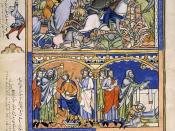For What reasons did the Hebrews want a king? The Hebrews request for a king was based on a number of reasons. AT the time of the Judges in 1290/1050 Israel was split into 12 tribes, the tribal system had several strengths but also had many weaknesses that seemed to outweigh the strengths. The tribal system meant there was a lack of social unity which led to fragmentation and rivalry this mean that the tribes would fight amongst themselves and were vulnerable to outside attack. The lack of social unity meant also that there was almost no political or social collusion in Israel this meant they lacked leadership and were disorganised throughout the tribes. They also had little amounts of tools and weapons and were underdeveloped in that sense. Overall the tribal system lacked a solid infrastructure and was constantly vulnerable to attack. These weaknesses formed the Hebrew argument that they needed a king to rule over them and provide the stability they craved.
In around 1200 a people called the Philistines landed at Gaza they set up five cities and were well organised and trained in combat and had a considerable amount of weapons at their disposal. This people posed a formidable threat to Israel and this was a main reason for the Hebrews wanting a king. There was a need for unity in Israel under one leader. There was a need for a leader for the Israelite army as we see in 1 Samuel 8:20. These leaders could irradicate the threat of the Philistines and rule them for years to come. At the time the system of the Judges was failing. Israel would sin against the lord Yahweh and he would deliver them into the hands of their enemies, a judge would then be appointed and save them from these enemies. This system never really worked and the whole cycle of events would continue. These Judges needed replacing by a king who would provide stability. Also at the time the Israelites had a burning desire to become like other nations, which had kings for themselves.
In conclusion the tribes of the Israelites had one main common ground, a common belief in God under the covenant. This belief was not enough on it's own, the nation needed stability to ensure it's survival and rid them of the threat of the Philistines and it seemed a king was the only answer.
What are the warnings Samuel gives against having a king? Samuel initially refused the Hebrews request for a king; this refusal was based on 4 main factors. Samuel argued that God Yahweh was the one true ruler of Israel and there was no need for a king, as the Lord would deliver them from he threat of the Philistines. He also argued that a king would be a rejection of Samuel and the end of the era of the judges. Samuel was a very important figure in the bible and to the Hebrews he was almost seen as a ruler of them. We can see his importance clearly in the bible because along with Jesus and Moses he was one of he only recorded births. He was a prophet and a priest and was given a huge amount of respect. To reject Samuel would have been a very hard thing for the Hebrews to do at that time. Samuel stated that the appointment of a king would make Israel like the Pagan nations and would be a costly thing to do in financial terms. (8:11-18.) Samuel warned the people that a king would take your sons and make them serve in his chariots and horses. He will take your daughters to be perfumers and cooks and bakers. He will take the best of your fields. A tenth of your grain. Your menservants and maidservants and the best of your cattle. And you yourselves will become his slaves. 1 Samuel 8:11-27. Samuel warned basically that a king would lead to oppression and not unity like the Hebrews wanted. The elders of Israel ignored his warnings and anointed a king anyway.
To what extent did Samuel's warnings come true? The warnings given by Samuel to a certain extent came true. The reign of Saul as a king was not the success as the people of Israel wanted. Some of the Hebrews needs on the other hand were fulfilled. A feeling of unity under one leader could be felt throughout the tribes of Israel and it seemed as if they were one nation. The reign of Saul started rather successfully. He defeated the Ammonites at Jabesh Gilead and was publicly anointed by the people as their king. 1 Samuel.11. Samuel's warning about a king being costly was very true. During Saul's reign as king the people of Israel were required to pay taxes, under the previous system they did not need to pat taxes and as a whole people were more prosperous. Despite raising an army which the Hebrew people craved they despised the fact they had to pay for it. The warning of the failure of the system of the judge sand the link with Samuel also came true. Saul in his reign failed to preserve this link and the Judges all but disappeared. The link with Samuel on the other hand did stay solid throughout he was seen still as a great man of Israel and in some ways more of a king than Saul. Samuel constantly undermined Saul as king and as a result Saul was doomed to failure. John Bright says that Samuel acted as guiding light to Saul through Philistine oppression. I would argue that Samuel was more of a hindrance to Saul than a guiding light. My claim is backed up in 15. 1-4 when Samuel instructs Saul as what to do this is not the action of a king, A king can make his own decisions Saul seems weak as a result of Samuel's orders. Another example of Samuel undermining Saul is when Saul has to make the burnt offering to the Lord because of Samuel not being there when he said he would.
Sauls reign was not totally unsuccessful and Samuel's warnings did not totally come true. Saul did fulfil the people's demands for a king and he was a good military leader. He also seemed at first a charismatic leader aswell. Saul's kingship seemed always destined to failure because of the unfair treatment from Samuel.
In conclusion Samuel's warnings of an oppressive king did come true to an extent and Sauls reign as king does seem to be unsuccessful. On the other hand though Saul did fulfil many of the people's demands and it seems to me that Samuel constantly undermined Saul and he wasn't a true leader as a result. In my opinion Saul was never going to be a true leader whenever Samuel was around. Samuel never really wanted a king and it is my opinion that Samuel did not want his respect and authority taken away from him.





